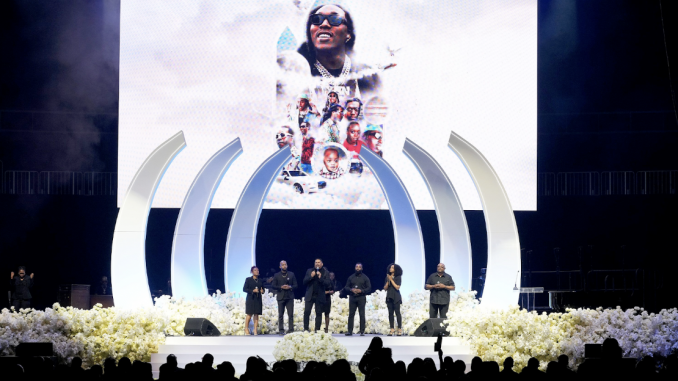
This past week on Nov. 1, Takeoff, one-third of popular rap trio Migos, was shot and killed in a bowling alley in Houston at the age of 28. His death has sparked discussion about the current epidemic of young rappers losing their lives to violence and drugs, as he is the fifth to die in 2022.
While this trend is nothing new, it still is shocking when artists continue to have their flames extinguished too early, cutting their careers short and depriving them of a long life. Takeoff, whose real name is Kirshnik Khari Ball, was the youngest member of Migos; he was a cousin to Offset and a nephew to Quavo, the other two rappers in the group. The shooting that resulted in his death was over an altercation within a dice game around 2:30 a.m., where someone began shooting about five shots into the crowd during an argument, hitting Takeoff in or around his head. Takeoff was pronounced dead at the scene and two others were injured, after Quavo called 911 and others tried to help. Born in 1994 and killed in 2022, Takeoff’s death has only brought more attention to this societal issue as he is only the latest young rapper to have met a cruel end from gun violence.
Just only a month ago, rapper PnB Rock was also shot and killed in a Los Angeles chicken and waffles shop after the assailant attempted to rob him. On Sept. 12, the Philadelphia rapper was out eating with a woman when he was attacked brutally, resulting in shots being fired and the rapper was rushed to the hospital, dying within the hour at the age of 30. PnB Rock, real name Rakim Allen, was well-known from his feature as a 2017 XXL Freshman and from hits with fellow rapper A Boogie wit da Hoodie. With no more than a month’s time after his death, Takeoff’s passing only becomes more poignant as they are just two rappers who have died this year out of five.
Other rappers such as JayDaYoungan, Trouble and J $tash have all lost their lives over the course of this year from gun violence, with the three of them dying at 24, 34 and 28 respectively. It seems that death has followed the career for a long time, as huge names in hip-hop and rap from the past have also died young, like Tupac Shakur and Biggie Smalls. In 2020, Pop Smoke died after being shot in a home invasion. Even 20-year-old controversial rapper XXXTentacion was shot and killed in 2018 due to a failed robbery outside a motorsports dealer in Florida, showing the continuation of this systemic issue throughout the years.
All the causes of death are similar — killed in a robbery, shot over an argument or dying in a shooting — and yet nothing changes. This raises an important question as to why rapping seems to be such a dangerous career and why artists are continuing to perpetuate this stereotype. Despite hearing about and seeing their musical peers die from gun violence, rappers remain in places with little to no security and around environments prevalent with crime and violence. These types of places are often their old neighborhoods, where they grew up and knew as home, and are used to spending time there. It is understandable that everybody wants their home to be somewhere safe, but these are usually the type of neighborhoods that they rapped about trying to get out of. It seems that it really can be a trap, as one is stuck in it after being raised there, leading to an untimely death in the same type of place.
Beyond gun violence as a cause of death, drugs are another recent cause of early deaths for rappers. Often attributed to pills, rappers like Lil Peep, Mac Miller and Juice WRLD have also died from using drugs — and these are all consecutive. From 2017 to 2019, those rappers died after each year in that very order, and those are just the biggest names that died from overdoses. This has not been out of the ordinary either, as rock artists like Jim Morrison have died from drug overdoses in the past, beyond the scope of rap. There are many more smaller artists that never made the headlines, and that goes for gun violence as well.
It is incredibly important for society to be aware of this problem, as it seems the trend will continue to set rap up as a fatal career, when it should be as viable as any other genre of music, let alone any other career. Yet the weight also lies on other rappers’ shoulders, as they must learn to lead by example and move away from gang culture. It is a tough separation to make, when one makes their name in the industry from touting their dangerous background, but sometimes it takes moving on from that situation to maintain their safety and success.
